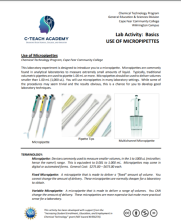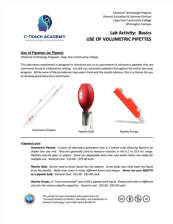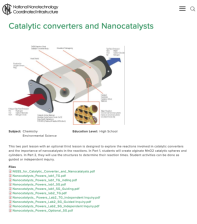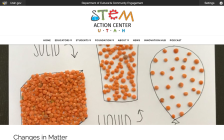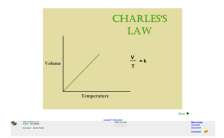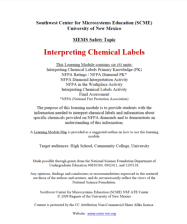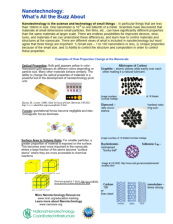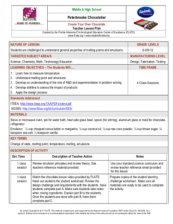Browse Resources
Resources |
|---|
This 9-page professional development activity, provided by Cape Fear Community College, introduces STEM instructors to the proper use of micropipettes. The laboratory procedure provides background on the use and setup of a micropipette, an introductory problem, instructions for the lab, and lab...
This 9-page professional development activity, provided by Cape Fear Community College, introduces STEM instructors to the proper use of volumetric pipettes (or pipets). The laboratory procedure provides background on the use, parts, and setup of a volumetric pipette, an introductory problem,...
This video and online calculator show how to calculate the molecular weight of a substance from the atomic weights given on the periodic table. Use the molecular weight to convert between the macroscopic scale (grams of a substance) and the microscopic scale (number of molecules of that substance)....
This lab, presented by the National Nanotechnology Coordinated Infrastructure, covers the concept of chemical reactions. Students will learn about "the reactions involved in catalytic converters and the importance of nanocatalysts in the reactions." Teacher Preparation Guides, Student Guides, and...
This lesson from the STEM Action Center - Utah describes how educators can develop a model to highlight changes in and the size of matter. This activity fulfills the UT SEEd Strand 5.2 standard.
This interactive presentation, created by Terry Bartelt and hosted by the Electromechanical Digital Library, discusses the history and theory of Charles's Law, which states, "the volume of a given quantity of gas varies directly with its temperature." A series of interactive flash animations show...
The Materials Science and Technology Teacher's Workshop (MAST) provides this activity to illustrate the heat energy that is given off during the oxidation of iron. The class will analyze commercial hand warmers and the chemical reaction that allows them to heat up inside their plastic bags. The...
Module Description:
This module, from Support Center for Microsystems Education (SCME), provides students "with the information needed to interpret chemical labels and information about specific chemicals provided on NFPA [National Fire Protection Association] diamonds and to demonstrate an...
This document, presented by the National Nanotechnology Coordinated Infrastructure, is a valuable chemistry reference sheet for high school students. Definition of terms, diagrams, abbreviations, mathematical notations, the periodic table, and other information related to nanotechnology and...
Lesson Description:
This collection from the Florida Advanced Technological Education (FLATE) Center includes two lessons intended to help students better understand the "general properties of melting points and emulsions." The first activity, intended for middle or high school students, asks...
|
| ← PreviousNext → |
